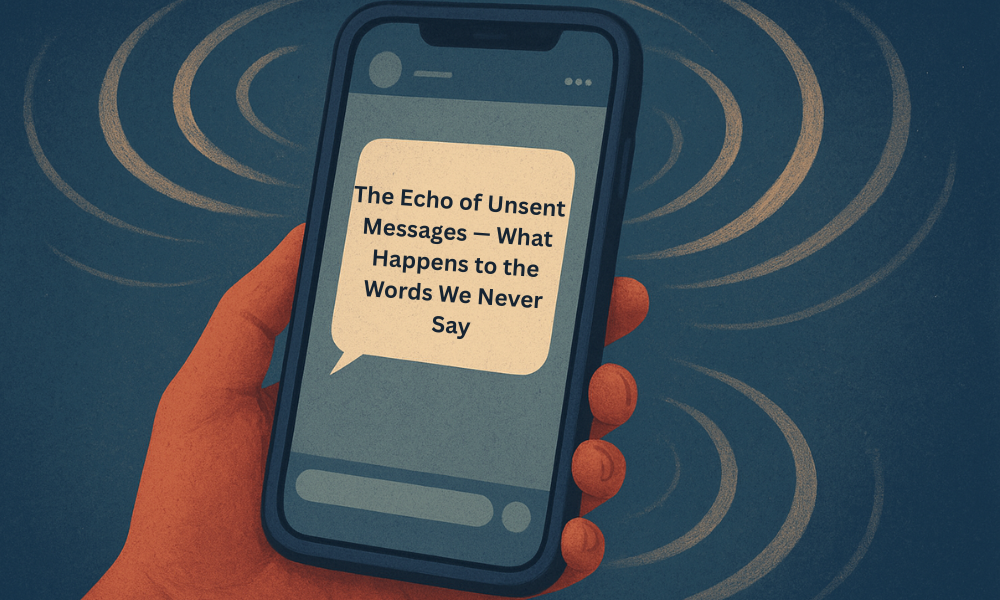The Echo of Unsent Messages — What Happens to the Words We Never Say
Introduction
At times, the strongest things we will ever say are the things we don’t say at all. We think it, we create it in writing, we erase it, or we simply leave it as a draft – half a feeling hanging out there in the digital ether. These unsent messages are bits of ourselves in the moments when we are feeling thoughts of honesty, hesitation, or heartbreak. They remind us that silence actually has its own story – something that hums softly underneath everything we think we are saying or creating.

The Psychology of Not Saying What Awaits
Many would argue that silence is emptiness, but more often, it is not. Silence is frequently substantive — full, in fact, of emotions, doubt, and what-ifs. We do not say what we need to say, because vulnerability is a potentially dangerous commitment. Once we say what we mean, we put ourselves at risk, and each of us must decide if we are ready to risk what may follow. For some of us, the hesitation is a self-protective measure; for others, a means of protecting another person’s identity from emotional damage. When we hold back words, we wait emotionally — they become emotional checkpoints for our internalized struggle of being honest but cautious, connecting but apprehensive. When we ultimately say what we have been holding back, we tell ourselves — and our minds reinforce — that it was a better decision than saying what we must say. But there will always be a small part of us wondering what we may have amended should have we just said what was waiting to be said. Not saying anything is not always sheer cowardice; sometimes, it is the only way to know how to survive.
The Emotional Burden of the Unsent
Unsent words do not go away; they reverberate inside of us. That text you contemplated sending — an apology, a confession, a final goodbye — does not dissipate but only serves as a dull pulsing that never finds out its rhythm. We revise and refine this message continuously in our heads, starting and stopping again, imagining how we might get the reaction we imagined. Eventually, these messages become emotional markers — an imprint of what we felt, but did not share out loud. They can inflict a quiet pain or a quiet comfort, depending on how we felt. Occasionally, we feel grateful we stayed quiet, and other occasions we nurse the ache of what might have been expressed. The emotional burden of the messages we did not send is evidence, or inquiry, that words have meaning — even if they never left our minds. These unsent words remind us that not every story needs an ending or resolution to have meaning.

Digital Phantoms — The Messages Waiting in Drafts
In the digital world, our apprehension has a place — the drafts folder. It is where our half-realized truths reside, suspended between thought and doing. Those unsent texts, emails, or DMs illustrate courage deferred and feelings in limbo. A confession that was too raw. An apology that was too late. A thank you that we didn’t know how to write. Technology has made our hesitation visible — made a laboratory creating shape and time-stamps our hesitation to silence. On occasion, we revisit a draft, reread it and feel old feelings faintly resurface. As if they became digital phantoms lingering in the corners of our screens. Not to frighten, but to remind us of the human qualities within ourselves. Each draft saves a version of ourselves we once were — more gentle, courageous, and naive — and that’s what makes them strangely valuable.
Healing in Silence, Letting Go
Not all words are meant to be spoken. Sometimes the act of writing but not sending is a healing unto itself. We pour our thoughts into a message, release the emotion, and find that we are simply okay without further communication or a response. Silence can be a boundary, closure, or even satisfactory communication in itself. Releasing the need to explain, to be understood, is a form of liberation in its own quiet way. It shows us that peace is not always in the conversation — it can sometimes be in a stillness. When we finally arrive at disconnecting the rehearsal of the un-said, we are also creating space for new words, new moments, and new beginnings. Healing does not come when the message is read. Healing starts when we have the ability to let it go — and keep moving forward lighter.
Conclusion
Maybe the messages we do not send wind up on some level getting delivered — not via messages, but through the energy we hold, the choices we make, and the silent growth for the rest of our lives after. Unsending does not necessarily denote unfinished; it may mean that we have said enough to ourselves. In the end, silence can act as its own kind of truth — little, steady, and profoundly human.
